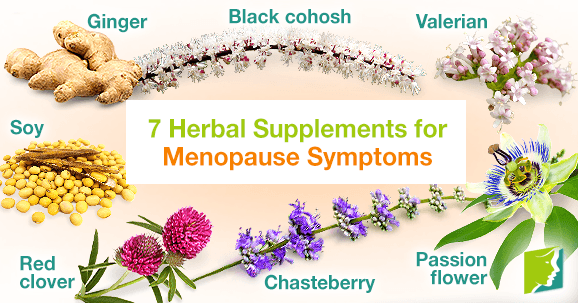Menopausal symptoms affect nearly all women to some degree during the menopause transition. These symptoms can include anything from vaginal dryness to mood swings, and they are primarily caused by hormonal fluctuations. Nowadays, many women choose to address them with herbal supplements rather than prescription drugs, as carry a smaller price tag and are perceived to be safer. The most popular ones include:

Phytoestrogenic Supplements
Some herbs contain phytoestrogens, which are believed to replenish estrogen levels in the body. These herbs are often used to fight different menopause symptoms at once.
Soy
Soy has been a popular herb among menopausal women because it is known to help symptoms like hot flashes due to its phytoestrogenic compounds, namely the isoflavonone called genistein. Soy is also high in protein, which helps promote hair growth and increase energy levels.
Black cohosh
Black cohosh contains estrogenic components produced by plants, which can help restore hormone balance by increasing estrogen levels. Black cohosh has been used to treat menopausal symptoms like vaginal dryness, night sweats, and hot flashes.
Red Clover
In addition to soy, red clover is a source of genistein, a phytoestrogen. Red clover is most commonly used to make herbal infusions.
Chasteberry
Chasteberry has been used for thousands of years for treating premenstrual symptoms, and today it is also used to help alleviate menopausal symptoms, namely breast pain.
Other supplements
There are other plant-based supplements that, although not hormonal in nature, can help diminish the severity of specific menopausal symptoms.
Passion Flower
Passion flower is a plant that has been used to treat sleep disorders, night sweats, anxiety, and gastrointestinal disorders. It is thought to increase levels of the mood-regulating neurotransmitter gamma-aminobutyric acid in the brain.
Ginger
Ginger is high in nutrients and antioxidants, and also has anti-inflammatory characteristics. It is a well-known herb for its numerous medicinal benefits, including relief from nausea and gastrointestinal discomfort, which makes it well-suited to treating the menopause symptoms of bloating and joint pain.
Valerian
Valerian has been used for centuries as a natural treatment for insomnia and anxiety because of its sedative characteristics. It is often prescribed in Europe as a sleep aid.
In addition, there are many natural supplements that have helped women balance their hormone levels and ease menopausal symptoms. Hormone-regulating supplements like Macafem nourish the endocrine glands and support the production of all sex hormones - not just estrogen - which leads to hormonal balance.
Menopause symptoms like breast pain, vaginal dryness, and hot flashes can be frustrating and interfere with daily life. These bothersome symptoms are primarily caused by hormone imbalance, and herbal supplements can help relieve them.
Sources
- Hidalgo, L.A. et al. (2005). The effect of red clover isoflavones on menopausal symptoms, lipids and vaginal cytology in menopausal women: a randomized, double-blind, placebo-controlled study. Gynecological Endocrinology, 21(5), 257-264. Retrieved from http://www.ncbi.nlm.nih.gov/pubmed/16373244
- National Center for Complementary and Alternative Medicine. (2012). Chasteberry. (2012). Retrieved on August 4, 2014 from http://nccam.nih.gov/health/chasteberry
- National Center for Complementary and Alternative Medicine. (2012). Soy. (Retrieved on August 4, 2014 from http://nccam.nih.gov/health/soy/ataglance.htm
- National Center for Complementary and Alternative Medicine. (2012). Black Cohosh. (2012). Retrieved on August 4, 2014 from http://nccam.nih.gov/health/blackcohosh/ataglance.htm
- National Institutes of Health. (2014). Valerian: MedlinePlus. Retrieved August 4, 2014, from http://www.nlm.nih.gov/medlineplus/druginfo/natural/870.html
- University of Maryland Medical Center. (2011). Passionflower. Retrieved August 4, 2014, from http://umm.edu/health/medical/altmed/herb/passionflower



